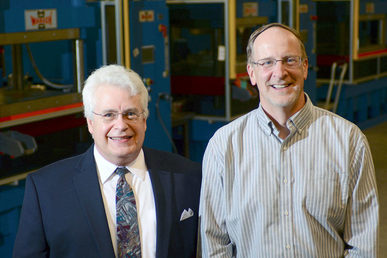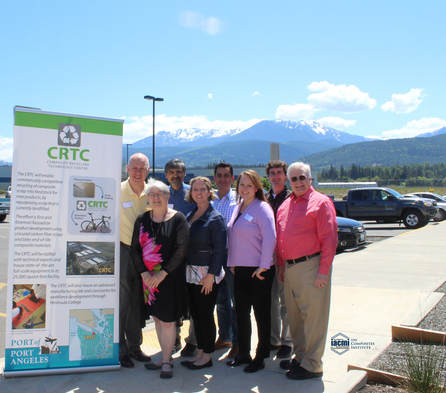 Bob Larsen (left) and David Walter (right) Bob Larsen (left) and David Walter (right) PORT ANGELES, WA - Wednesday, July 26, 2017 -After launching the world’s first facility to recycle uncured carbon fiber composite into new consumer products and bringing new jobs and technology to Port Angeles, Composite Recycling Technology Center (CRTC) CEO Bob Larsen is retiring. Larsen will leave the post on Aug. 11. He will be replaced by Chief Operating Officer David Walter, who will combine his current role with that of CEO. “Bob has put his heart and soul into making the CRTC successful – from finding start-up funding and bringing in research projects and partners, to setting up the facility, building the team and producing our first product,” Walter said. “He is leaving the CRTC in good shape and with everything we need to move forward and be successful.” Larsen has served as CEO since March 2016. Prior to that he was chairman of the CRTC’s Board of Directors. He was instrumental in establishing strategic partnerships with Toray Composite Materials America, ELG Carbon Fibre, Ltd., and the Institute for Advanced Composite Manufacturing Innovation (IACMI) to create new markets for recycled carbon fiber materials left over from aerospace manufacturing. “Starting up the CRTC and bringing new jobs and economic development to Port Angeles has been a very gratifying experience, and I have been honored to be able to serve our community,” Larsen said. “But I realized, when my wife and I went on our ‘bucket list’ vacation to Europe recently, that there are a lot of things we want to do together that I don’t have time to do with my current responsibilities. The CRTC is very well positioned for future success and I look forward to cheering them on.” From its new, state-of-the-art facility leased from the Port of Port Angeles, the CRTC has pioneered the recycling and reuse of tons of uncured carbon fiber composite scrap that would otherwise go to landfills. The CRTC’s focus is to create jobs and drive economic development in Clallam County. The U.S. produces about 29 million pounds of carbon fiber scrap per year, with 2 million pounds per year produced in Washington state – a volume expected to double over the next five to eight years, with the expansion of regional manufacturing. Under a new contract with IACMI, the CRTC will pioneer ways to automate processing of this scrap and remanufacture it into new consumer products. This technology breakthrough is essential so carbon fiber scrap can be processed in high volumes, fulfilling the enormous potential for energy savings and carbon reduction and creating a global composites recycling industry. For its technological innovation and new market creation, CRTC earned the Silver Award for Sustainability from Seattle Business Magazine in 2017. The company has created 16 jobs and more than $3 million in new economic activity over the past year, garnering a 2016 Award of Excellence from the Clallam County Economic Development Corporation. The CRTC has a multi-faceted agreement with Toray Composite Materials America for scrap carbon fiber supply and materials development, and continues to work very collaboratively with this strategic partner. Funding for the CRTC recycling facility and campus was provided by the Port of Port Angeles, the U.S. Economic Development Administration, the Washington State Department of Commerce, the Clallam County Opportunity Fund and the City of Port Angeles. The CRTC campus also houses Peninsula College’s Advanced Manufacturing Composite Technology program with classrooms, offices, and lab facilities. The program gives students hands-on training in advanced materials recycling and remanufacturing techniques. Co-location with CRTC provides students with unequaled opportunities for internships, manufacturing and R&D experience, and exposure to production operations. ###
0 Comments
 Back Row, left to right: Cliff Eberle, Uday Vaidya PhD, Soydan Ozcan, Geoffrey Wood. Front Row, Left to right: Dr. Sharon Buck, Robin Pate, Joannie Harmon Heath, Robert Larsen Back Row, left to right: Cliff Eberle, Uday Vaidya PhD, Soydan Ozcan, Geoffrey Wood. Front Row, Left to right: Dr. Sharon Buck, Robin Pate, Joannie Harmon Heath, Robert Larsen PORT ANGELES, WA – In 2016, the Composite Recycling Technology Center (CRTC) became the first facility in the world to transform carbon fiber composite pre-preg scrap into new products. Now, thanks to a new contract with a national manufacturing institute, the CRTC will pioneer ways to automate processing of this scrap. This technology breakthrough is essential so recycled carbon fiber (rCF) can be processed in high volumes fulfilling its enormous potential for energy savings and carbon reduction and creating a global composites recycling industry. The one-year contract with the Institute for Advanced Composite Manufacturing Innovation (IACMI) will provide over $400,000 for the CRTC’s work to design and build processing equipment designed specifically to prepare uncured aerospace carbon fiber scrap for high volume manufacturing applications. The CRTC plans to begin making products using this process by the end of 2017 and quadruple the throughput of scrap material by the middle of 2018. The novel manufacturing machinery developed under this contract will be instrumental in growing the number and volume of products made at the CRTC. Moreover, the technology developed by the CRTC will be made available to other facilities seeking to recycle composites in high volume, boosting the emergence of this new industry. This contract announcement further cements the CRTC/IACMI partnership announced one year ago at a celebratory MOU signing event featuring leadership from the two partnering organizations, The Department of Energy’s Advanced Manufacturing Office, Washington’s Department of Commerce, the Port of Port Angeles, and local economic development groups. “The IACMI contract is a landmark achievement,” said the CRTC’s CEO Bob Larsen. “It validates the CRTC’s technology approach from the national level and is a strong vote of confidence in our young company and its business plans. It supports our drive to self-sufficiency and for creating good-paying local jobs and advances the growth of the carbon fiber recycling industry, a core part of the CRTC’s and IACMI’s missions.” IACMI-The Composites Institute is one of over ten national Manufacturing Innovation Institutes that accelerate U.S. advanced manufacturing by supporting research and development of new technologies, production processes, and workforce training opportunities via shared contributions from the public and private sectors. IACMI’s focus on advancing composite material technology includes a significant effort in recycling of composite materials – a sizable challenge constraining the growth of the industry. Washington Senator Maria Cantwell, a longtime champion of CRTC, had this to say about the agreement: “Washington state and the Composite Recycling Technology Center are continuing to lead the way on carbon fiber recycling technology. These are the types of public-private partnerships we should be investing in to grow good paying manufacturing jobs.” “Technical innovation is a major driver of Washington state’s economy and it’s happening everywhere, not just Seattle,” said Commerce Director Brian Bonlender. “Our Clean Energy Fund is one way in which we invest to strengthen rural communities by cultivating new business opportunities and jobs for the low-carbon future. The Port Angeles CRTC leveraged state and local funding to attract national and international attention and additional investment that is advancing their world-leading work to produce new high-volume, low-cost products out of scrap aerospace carbon fiber.” The contract also includes planning support from the CRTC for IACMI’s recycled composites program. The CRTC will be working closely with IACMI’s Materials and Processing researchers from Oak Ridge National Laboratory and the University of Tennessee, Knoxville throughout the contract. The technical targets of this project will provide the building blocks for future programs in higher-throughput advanced rCF equipment development, leading to the use of repurposed carbon composite scrap in vehicles and clean energy production applications within 5 years. The CRTC, an independent 501(c)(3) non-profit corporation, was launched by the Port of Port Angeles in 2015 as an economic development initiative to respond to the growing need of the composite and aerospace industries to recycle and reuse remnants from their production processes. It is the only company in the world to divert uncured carbon fiber scrap from landfills and transform it into consumer products. The CRTC moved into a new production facility on 18th Street in Port Angeles in August, 2016, and currently employs 17 people. 2018 projections point to more than doubling the number of employees by the end of next year. The CRTC has a supply and technical support agreement with Toray Composites America, and a multi-faceted agreement with ELG Carbon Fibre for joint recycled carbon fiber supply as well as rCF material and product development. The CRTC’s campus also houses Peninsula College’s Advanced Manufacturing-Composite Technology program with classrooms, offices, and lab facilities. This program gives students hands-on training in advanced materials recycling and remanufacturing techniques. Co-location with the CRTC provides students with unequaled opportunities for internships, manufacturing and R&D experience, and exposure to production operations. For more information about the CRTC, see www.compositerecycling.org. For more information about IACMI-The Composites Institute, visit www.iacmi.org. FOR IMMEDIATE RELEASE. For more information, contact: Bob Larsen, 360-819-1202 ##### |

 RSS Feed
RSS Feed